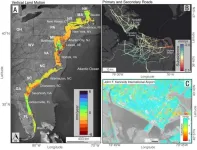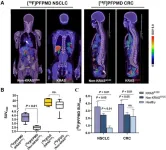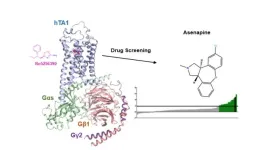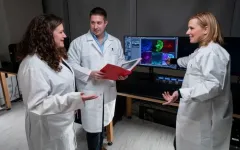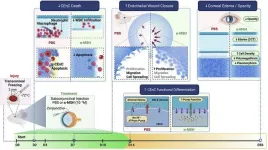(Press-News.org) Understanding Climate Mobilities: New study examines perspectives from South Florida practitioners
As climate change continues to impact people across South Florida, the need for adaptive responses becomes increasingly important.
A recent study led by researchers at the University of Miami Rosenstiel School of Marine, Atmospheric, and Earth Science, assessed the perspectives of 76 diverse South Florida climate adaptation professionals. The study titled, “Practitioner perspectives on climate mobilities in South Florida” was published in the December issue of the Journal Oxford Open Climate Change, and explores the expectations and concerns of practitioners from the private sector, community-based organizations, and government agencies about the region’s ability to adapt in the face of increasing sea level rise and diverse consequences for where people live and move, also known as climate mobility.
Conducted through extensive interviews, the research underscores the growing significance of climate mobility as a crucial adaptive response in the face of increased climate challenges. While previous studies have primarily focused on resident perspectives on mobility, this study delves into the views of professionals, offering insights that could potentially shape future strategies and outcomes.
"This study is a deep dive aiming to understand the perspectives of leading experts on where we are right now in our climate responses in South Florida,” said Katharine Mach, lead author of the study and a professor and chair of the Department of Environmental Science and Policy at the Rosenstiel School. “These types of conversations are crucial to our prospects for unleashing innovations and successes in regional climate adaptations and preparedness.”
Key findings reveal a consensus among the professionals about the inevitability of various forms of climate mobilities in South Florida. Anticipated movements of people and infrastructure assets away from hazardous areas were highlighted, indicating an urgent need for comprehensive adaptation planning.
However, while recognizing the necessity of climate mobility strategies, the interviewed practitioners expressed concerns regarding the current impact of such movements. They highlighted issues of distributional inequities, socio-cultural disruptions, and financial disparities arising from ongoing migrations and gentrification in which climate plays some role.
The findings illuminated a critical gap between individual preparedness among practitioners and the overall readiness of the region to support and manage the expected climate-driven relocations. This discrepancy raises concerns about collective-action failures and the urgency for a more ambitious, long-term transition plan.
Climate mobilities, while presenting benefits, also pose significant challenges. They serve as a path for adaptation planning and policies, prompting crucial questions about incorporation into policy planning and the need for fundamental innovations.
According to the researchers, the study serves as an intervention itself, providing insights that might otherwise remain unexplored, fostering a deeper understanding of the challenges and opportunities associated with climate mobilities. The findings aim to inform and guide policymakers, stakeholders, and practitioners toward more proactive and inclusive approaches to climate adaptation.
The study’s authors include: Katharine J. Mach1,2, Jennifer Niemann1,2, Rosalind Donald3, Jessica Owley1,2,4, Nadia A. Seeteram5, A.R. Siders 6,7, Xavier I. Cortada 2,4,8,9, Alex Nyburg10, Adam Roberti11, Ian A. Wright12
1 Department of Environmental Science and Policy, Rosenstiel School of Marine, Atmospheric, and Earth Science, University of Miami, Miami, FL, USA. 2 Leonard and Jayne Abess Center for Ecosystem Science and Policy, University of Miami, Coral Gables, FL, USA. 3 School of Communication, American University, Washington, DC, USA. 4 University of Miami School of Law, Coral Gables, FL, USA. 5 Columbia Climate School, Columbia University, New York, NY, USA. 6 Disaster Research Center, University of Delaware, Newark, DE, USA. 7 Biden School of Public Policy and Administration and Geography and Spatial Sciences, University of Delaware, Newark, DE, USA. 8 Department of Art and Art History, University of Miami, Coral Gables, FL, USA. 9 Department of Pediatrics, University of Miami Leonard M. Miller School of Medicine, Miami, FL, USA. 10 Department of Biology, University of Miami, Coral Gables, FL, USA. 11 Xavier Cortada Foundation, Pinecrest Gardens, FL, USA. 12 Department of Economics, University of Miami, Coral Gables, FL, USA
The study was supported by the University of Miami Laboratory for Integrative Knowledge (U-LINK), the Leonard and Jayne Abess Center for Ecosystem Science and Policy, the Rosenstiel School of Marine, Atmospheric, and Earth Science and the U.S. National Science Foundation, award numbers 2034308 and 2034239.
About the University of Miami
The University of Miami is a private research university and academic health system with a distinct geographic capacity to connect institutions, individuals, and ideas across the hemisphere and around the world. The University’s vibrant and diverse academic community comprises 12 schools and colleges serving more than 17,000 undergraduate and graduate students in more than 180 majors and programs. Located within one of the most dynamic and multicultural cities in the world, the University is building new bridges across geographic, cultural, and intellectual borders, bringing a passion for scholarly excellence, a spirit of innovation, a respect for including and elevating diverse voices, and a commitment to tackling the challenges facing our world. Founded in the 1940’s, the Rosenstiel School of Marine, Atmospheric, and Earth Science has grown into one of the world’s premier marine and atmospheric research institutions. Offering dynamic interdisciplinary academics, the Rosenstiel School is dedicated to helping communities to better understand the planet, participating in the establishment of environmental policies, and aiding in the improvement of society and quality of life. www.earth.miami.edu.
END
Understanding climate mobilities: New study examines perspectives from South Florida practitioners
As climate change continues to impact people across
2024-01-02
ELSE PRESS RELEASES FROM THIS DATE:
Study: From NYC to DC and beyond, cities on the East Coast are sinking
2024-01-02
Major cities on the U.S. Atlantic coast are sinking, in some cases as much as 5 millimeters per year – a decline at the ocean’s edge that well outpaces global sea level rise, confirms new research from Virginia Tech and the U.S. Geological Survey.
Particularly hard hit population centers such as New York City and Long Island, Baltimore, and Virginia Beach and Norfolk are seeing areas of rapid “subsidence,” or sinking land, alongside more slowly sinking or relatively stable ground, increasing the risk to roadways, runways, building foundations, rail ...
New PET tracer noninvasively identifies cancer gene mutation, allows for more precise diagnosis and therapy
2024-01-02
Reston, VA—A novel PET imaging tracer has been proven to safely and effectively detect a common cancer gene mutation that is an important molecular marker for tumor-targeted therapy. By identifying this mutation early, physicians can tailor treatment plans for patients to achieve the best results. This research was published in the December issue of The Journal of Nuclear Medicine.
Kirsten rat sarcoma (KRAS) is a commonly mutated oncogene that is present in approximately 20-70 percent of cancer cases. Patients with KRAS mutations usually respond poorly to standard therapies. As such, the National Comprehensive ...
Evolution might stop humans from solving climate change, says new study
2024-01-02
Central features of human evolution may stop our species from resolving global environmental problems like climate change, says a new study led by the University of Maine.
Humans have come to dominate the planet with tools and systems to exploit natural resources that were refined over thousands of years through the process of cultural adaptation to the environment. University of Maine evolutionary biologist Tim Waring wanted to know how this process of cultural adaptation to the environment might influence the goal of solving global environmental problems. ...
January issues of APA journals cover antidepressant outcomes, disparities in school-based support, civil commitment hearings, and more
2024-01-02
WASHINGTON, D.C., Jan 2, 2024 — The latest issues of three American Psychiatric Association journals, The American Journal of Psychiatry, Psychiatric Services and The American Journal of Psychotherapy are now available online.
The January issue of The American Journal of Psychiatry features studies focusing on improving clinical outcomes and informing new interventions. Highlights include:
Predicting Acute Changes in Suicidal Ideation and Planning: A Longitudinal Study of Symptom Mediators and the Role of the Menstrual ...
Memory, brain function, and behavior: exploring the intricate connection through fear memories
2024-01-02
In a world grappling with the complexities of mental health conditions like anxiety, depression, and PTSD, new research from Boston University neuroscientist Dr. Steve Ramirez and collaborators offers a unique perspective. The study, recently published in the Journal of Neuroscience, delves into the intricate relationship between fear memories, brain function, and behavioral responses. Dr. Ramirez, along with his co-authors Kaitlyn Dorst, Ryan Senne, Anh Diep, Antje de Boer, Rebecca Suthard, Heloise ...
Demystifying a key receptor in substance use and neuropsychiatric disorders
2024-01-02
New York, NY (January 2, 2024)—Researchers at the Icahn School of Medicine at Mount Sinai have uncovered insights into the potential mechanism of action of the antipsychotic medication asenapine, a possible therapeutic target for substance use and neuropsychiatric disorders. This discovery may pave the way for the development of improved medications targeting the same pathway.
Their findings, detailed in the January 2 online issue of Nature Communications https://doi.org/10.1038/s41467-023-44601-4, show that a brain protein known as the TAAR1 receptor, a drug target known to regulate dopamine signaling in key reward pathways in the brain, differs ...
Elusive cytonemes guide neural development, provide signaling ‘express route’
2024-01-02
St. Jude Children’s Research Hospital scientists found that cytonemes (thin, long, hair-like projections on cells) are important during neural development. Cytonemes connect cells communicating across vast distances but are difficult to capture with microscopy in developing vertebrate tissues. The researchers are the first to find a way to visualize how cytonemes transport signaling molecules during mammalian nervous system development. The findings were published in Cell.
“We showed cytonemes are a direct express route for signal transport,” said corresponding author ...
Pioneering study indicates a potential treatment for corneal endothelial disease, reducing the need for corneal transplants
2024-01-02
Philadelphia, January 2, 2024 – Findings from a pioneering study in The American Journal of Pathology, published by Elsevier, reveal that administration of the neuropeptide α-melanocyte–stimulating hormone (α-MSH) promotes corneal healing and restores normal eye function to an otherwise degenerating and diseased cornea by providing protection against cell death and promoting cell regeneration.
Due to a lack of currently available medical therapy, patients suffering from corneal endothelial disease, ...
Diversity of bioluminescent beetles in Brazilian savanna has declined sharply in 30 years
2024-01-02
At night in the Cerrado, Brazil’s savanna and second-largest biome, larvae of the click beetle Pyrearinus termitilluminans, which live in termite mounds, display green lanterns to capture prey attracted by the bright light.
In more than 30 years of expeditions with his students to Emas National Park and farms around the conservation unit in Goiás state to collect specimens, the phenomenon has never been so rare, said Vadim Viviani, a professor at the Federal University of São Carlos’s Science and Technology for Sustainability Center (CCTS-UFSCar) in Sorocaba, São Paulo state.
“In the 1990s, we ...
Binghamton University professor and Nobel Laureate Stanley Whittingham wins 2023 VinFuture Grand Prize
2024-01-02
Binghamton University, State University of New York Distinguished Professor and Nobel Laureate M. Stanley Whittingham has been chosen as the joint winner of the $3 million 2023 VinFuture Grand Prize in recognition of his contributions to the invention of lithium-ion batteries. The prize recognized how the combination of solar energy and lithium battery storage is overcoming climate change and was recently presented by the Prime Minister of Vietnam.
“I am truly honored to be chosen for this prestigious honor,” said Whittingham. “VinFuture’s efforts to recognize green and sustainable energy is a noble cause, and ...
LAST 30 PRESS RELEASES:
Scientists identify smooth regional trends in fruit fly survival strategies
Antipathy toward snakes? Your parents likely talked you into that at an early age
Sylvester Cancer Tip Sheet for Feb. 2026
Online exposure to medical misinformation concentrated among older adults
Telehealth improves access to genetic services for adult survivors of childhood cancers
Outdated mortality benchmarks risk missing early signs of famine and delay recognizing mass starvation
Newly discovered bacterium converts carbon dioxide into chemicals using electricity
Flipping and reversing mini-proteins could improve disease treatment
Scientists reveal major hidden source of atmospheric nitrogen pollution in fragile lake basin
Biochar emerges as a powerful tool for soil carbon neutrality and climate mitigation
Tiny cell messengers show big promise for safer protein and gene delivery
AMS releases statement regarding the decision to rescind EPA’s 2009 Endangerment Finding
Parents’ alcohol and drug use influences their children’s consumption, research shows
Modular assembly of chiral nitrogen-bridged rings achieved by palladium-catalyzed diastereoselective and enantioselective cascade cyclization reactions
Promoting civic engagement
AMS Science Preview: Hurricane slowdown, school snow days
Deforestation in the Amazon raises the surface temperature by 3 °C during the dry season
Model more accurately maps the impact of frost on corn crops
How did humans develop sharp vision? Lab-grown retinas show likely answer
Sour grapes? Taste, experience of sour foods depends on individual consumer
At AAAS, professor Krystal Tsosie argues the future of science must be Indigenous-led
From the lab to the living room: Decoding Parkinson’s patients movements in the real world
Research advances in porous materials, as highlighted in the 2025 Nobel Prize in Chemistry
Sally C. Morton, executive vice president of ASU Knowledge Enterprise, presents a bold and practical framework for moving research from discovery to real-world impact
Biochemical parameters in patients with diabetic nephropathy versus individuals with diabetes alone, non-diabetic nephropathy, and healthy controls
Muscular strength and mortality in women ages 63 to 99
Adolescent and young adult requests for medication abortion through online telemedicine
Researchers want a better whiff of plant-based proteins
Pioneering a new generation of lithium battery cathode materials
A Pitt-Johnstown professor found syntax in the warbling duets of wild parrots
[Press-News.org] Understanding climate mobilities: New study examines perspectives from South Florida practitionersAs climate change continues to impact people across

